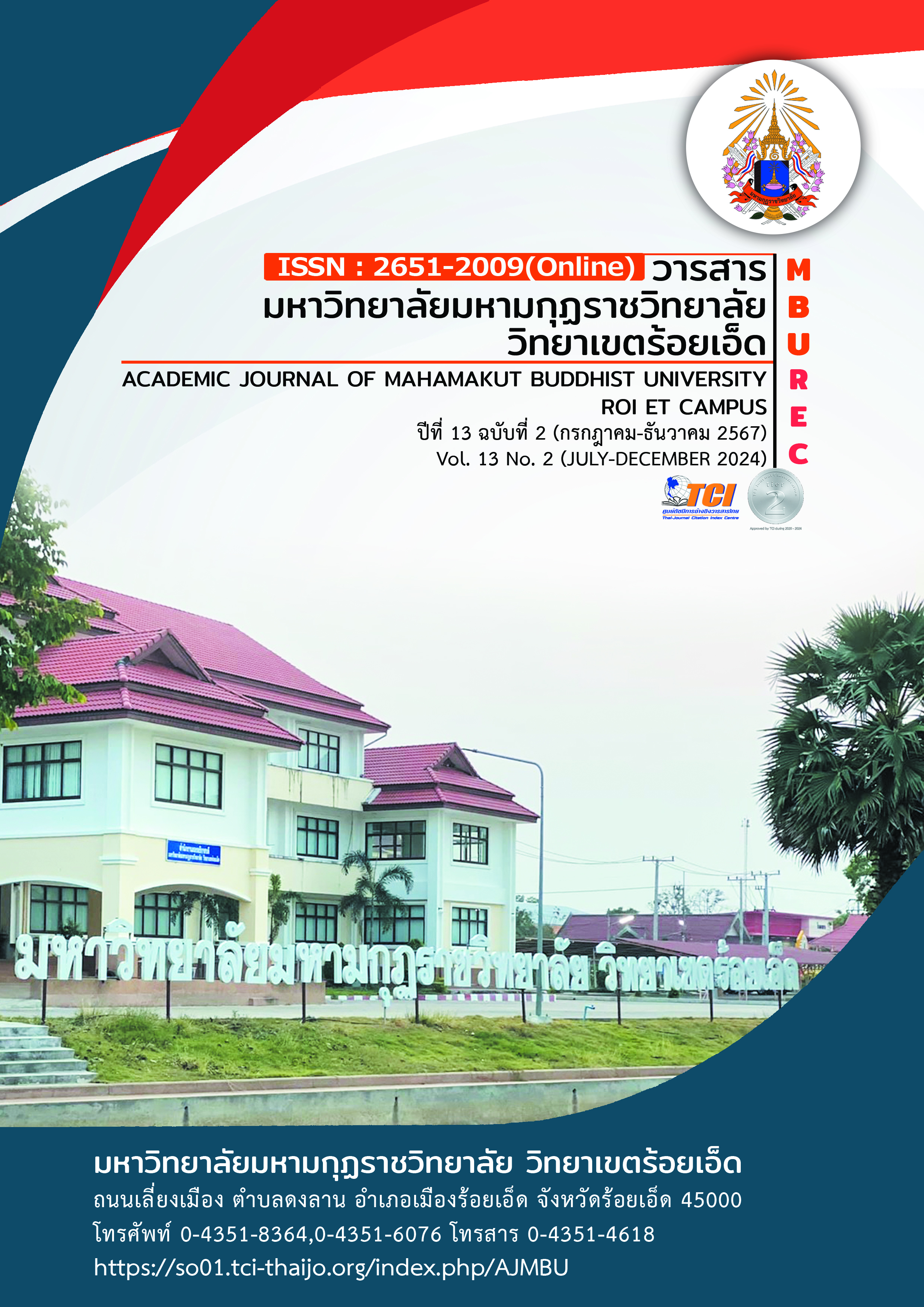MORE LEARNING SUPPLEMENTED WITH A CONCEPT MAP ON ELECTRIC FAN TO ENHANCE MODELING SKILLS OF GRADE 9 STUDENTS
Main Article Content
Abstract
The purposes of this study were to study and compare the modeling skills of Mathayom 3 students learning with MORE learning supplemented with concept maps on the subject of electric fans. The sample group used in this research was 20 grade 9 students. This study design was one-group pretest-posttest design. The research tools consisted of 1) a MORE learning plan supplemented with concept maps on the topic of electric fans, 2) a modeling skills test, which was a subjective test. The data were analyzed for mean, standard deviation, percentage and hypothesis test for compare conceptual understanding of food nutrients and digestive system after learning higher than before by t-test for dependent sample.
The results of this study showed that the mean score for Issue 1; simulated drawing was 3.15 (78.75%), the result was in a 'good' level. The mean score for Issue 2; complete writing was 2.55 (63.75%), the result was in the 'moderate' level. Overall, the mean score for modeling skills was 5.70 (71.25%), the result was in the 'moderate' level. When comparing the mean score of modeling skills with the post-learning criterion of not less than 70%, it was found that students had statistically significant higher modeling skills in Issue 1 - complete simulated drawing - compared to the criterion of not less than 70%, at a significant level of .01. However, in Issue 2 - complete writing of the workflow - their skills were lower than the criterion of not less than 70%. Overall, their post-learning modeling skills were higher than the criterion of not less than 70%.
Article Details

This work is licensed under a Creative Commons Attribution-NonCommercial-NoDerivatives 4.0 International License.
References
กระทรวงศึกษาธิการ. (2551). หลักสูตรแกนกลางการศึกษาขั้นพื้นฐาน พุทธศักราช 2551 (ฉบับปรับปรุง 2560). พิมพ์ครั้งที่ 2. กรุงเทพมหานคร : สำนักงานคณะกรรมการการศึกษาขั้นพื้นฐาน.
ธนวัฒน์ สิงห์ปลอด. (2562). การพัฒนาบทปฏิบัติการที่เน้นแบบจำลองเป็นฐาน เรื่อง ไฟฟ้าเบื้องต้น สำหรับนักเรียนชั้นมัธยมศึกษาปีที่ 3. วิทยานิพนธ์การศึกษามหาบัณฑิต สาขาวิชาวิทยาการทางการศึกษาและการจัดการเรียนรู้. คณะศึกษาศาสตร์ : มหาวิทยาลัยศรีนครินทรวิโรฒ.
ประสาท เนืองเฉลิม. (2558). การเรียนรู้วิทยาศาสตร์ในศตวรรษที่ 21. กรุงเทพมหานคร : บริษัทแอคทีฟ พริ้นท์ จำกัด.
พวงรัตน์ ทวีรัตน์. (2543). วิธีการวิจัยทางพฤติกรรมศาสตร์และสังคมศาสตร์. พิมพครั้งที่ 7กรุงเทพมหานคร : สำนักทดสอบทางการศึกษาและจิตวิทยา มหาวิทยาลัยศรีนครินทรวิโรฒ.
วรรณทิพา รอดแรงค้า และจิต นวนแก้ว. (2542). การพัฒนาการคิดของนักเรียน ด้วยกิจกรรมทักษะกระบวนการทางวิทยาศาสตร์. พิมพ์ครั้งที่ 2. กรุงเทพมหานคร : สถาบันพัฒนาคุณภาพวิชาการ.
วิจารณ์ พานิช. (2555). วิธีสร้างการเรียนรู้เพื่อศิษย์ในศตวรรษที่ 21. กรุงเทพมหานคร : มูลนิธิสดศรี-สฤษดิ์วงศ์.
สถาบันส่งเสริมการสอนวิทยาศาสตร์และเทคโนโลยี กระทรวงศึกษาธิการ. (2561). หนังสือเรียนรายวิชาวิทยาศาสตร์ ชั้นมัธยมศึกษาปีที่ 1 เล่ม 1 ตามมาตรฐานการเรียนรู้และตัวชี้วัด กลุ่มสาระการเรียนรู้วิทยาศาสตร์ (ฉบับปรับปรุง พ.ศ.2560) ตามหลักสูตรแกนกลางการศึกษาขั้นพื้นฐาน พุทธศักราช 2551. กรุงเทพมหานคร : โรงพิมพ์ สกสค. ลาดพร้าว.
สมเกียรติ พรพิสุทธิมาศ. (2551). การสอนวิทยาศาสตร์โดยเน้นทักษะกระบวนการ. ก้าวทันโลก วิทยาศาสตร์. 8(2). 28-38.
สำนักงานปฏิรูปการศึกษา. (2545). การจัดการเรียนรู้ที่เน้นผู้เรียนสำคัญที่สุด. กรุงเทพมหานคร :สำนักงานปฏิรูปการศึกษา (สปค.).
สำนักงานเลขาธิการสภาการศึกษา. (2550). การจัดการเรียนรู้แบบประสบการณ์และแบบที่เน้นปฏิบัติ. กรุงเทพมหานคร : ชุมนุมสหกรณ์การเกษตรแห่งประเทศไทย.
Akinbobola, A.O. and Afolabi, F. (2010). Analysis of science process skills in west African senior secondary school certificate physics practical examinations in Nigeria. Bulgarian. Journal of Science and Education Policy. 4(1). 32-47.
Aktamis, H. and Yenice, N. (2010). Determination of the science process skills and critical thinking skill levels. Procedia Social and Behavioral Sciences. 2(2). 3282-3288.
Bryce, C. M., Baliga, V. B., De Nesnera, K. L., Fiack, D., Goetz, K., Tarjan, L. M., ... Gilbert, G. S. (2016). Exploring Models in the Biology Classroom. The American Biology Teacher. 78(1). 35-42.
Harrison, A. G., & Treagust, D. F. (1996). Secondary students' mental models of atoms and molecules: Implications for teaching chemistry. Science Education. 80(5). 509–534.
Marzano, R.J., Pickering, D.J. and Pollock, J.E. (2001). Classroom Instruction that Works: Research-based Strategies for Increasing Student Achievement. Virginia : Association for Supervision and Curriculum Development.


